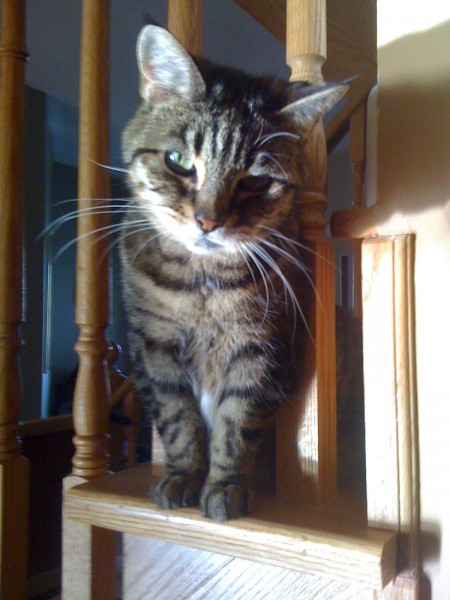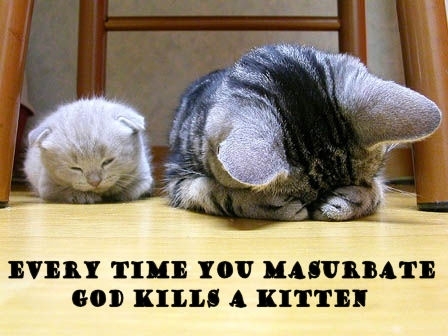Decades
Published 27 Jul 2022Welcome to our history channel, run by those with a real passion for history & that’s about it. In today’s video, we will be exploring 6 odd Cold War facts.
(more…)
August 27, 2023
6 Strange Facts About the Cold War
September 23, 2022
A Short History of Ships Cats – Floating Felines, Maritime Moggies and Kleptomaniac Kittens
Drachinifel
Published 26 Feb 2020A quick look at the origins of a vital part of the ship’s maintenance crew, and some notable examples.
(more…)
October 2, 2021
QotD: Cat-haters
Like 95% of men in America, I am one hundred percent in favor of cat-hunting, although I am not part of the 75% who support hunting non-feral cats living in their girlfriends’ apartments.
Steve H. “Time to Shoot All the Cats”, Hog on Ice, 2005-04-14.
July 9, 2018
QotD: The comforting sound of a cat purring
It seems there’s a woman named Elizabeth von Muggenthaler (wonderful name, so redolent of mad science and gothic castles!) who has discovered that cats purr in a range of acoustic frequencies that are widely known in the medical literature to stimulate tissue healing, especially of bone and connective tissue.
Ms. Muggenthaler does not propose to junk the conventional account that cats purr to express sociability and/or contentment, but she suggests that cats purr as a form of self-healing as well, and has designed various clever experiments that appear to confirm this.
She may also have explained why humans enjoy the sound. Like purring itself, the healing effects of gentle vibrations in those particular frequency ranges have probably been significant in the mammalian line long enough for humans to inherit a mild instinctive tropism for them. I wouldn’t be at all surprised if the human ability to become fond of certain varieties of repetitive mechanical noises has a similar ground.
Eric S. Raymond, “The Hand-Reared Cat”, Armed and Dangerous, 2009-07-01.
March 14, 2015
BAHFest West 2014 – Catherine Hofler: Why Cats Sprint Out of the Room for No Apparent Reason
Published on 31 Dec 2014
Catherine Hofler, the Director of Research at Emerald Therapeutics, explains the regression toward cardiovascular mean in Felis catus via sporadic locomotion.
BAHFest is the Festival of Bad Ad Hoc Hypotheses, a celebration of well-researched, logically explained, and clearly wrong evolutionary theory. Additional information is available at http://bahfest.com/
BAHFest West was a part of the 2014 Bay Area Science Festival http://www.bayareascience.org/
August 9, 2012
KittyCam project proves they are cute, cuddly … and deadly
Do you let your cat out into the great outdoors? If you’re fond of other small creatures, you may want to reconsider that policy:
Those cute kittens whose faces are peer from endless posts on Pinterest are actually predators, and a third of those trailed in a county in Georgia are wandering around outdoors capturing and killing other animals.
The army of assassins was discovered by folks from the University of Georgia and the National Geographic Society, who strapped video cameras around the necks of 60 cats to record their atrocities for a year in a project known as KittyCam.
[. . .]
“In Athens-Clarke County, we found that about 30 per cent of the sampled cats were successful in capturing and killing prey, and that those cats averaged about one kill for every 17 hours outdoors or 2.1 kills per week.
[. . .]
“If we extrapolate the results of this study across the country and include feral cats, we find that cats are likely killing more than four billion animals per year, including at least 500 million birds,” Dr George Fenwick, president of American Bird Conservancy, cried indignantly.
“Cat predation is one of the reasons why one in three American bird species are in decline.”
March 10, 2012
Some diseases may be caused by “endogenous” retrovirii
Matt Ridley on some recent discoveries in genetics and medicine that may help to explain certain diseases like multiple sclerosis:
The virus implicated in multiple sclerosis is called HERV-Fc1, a bizarre beast called an “endogenous” retrovirus. What this means is that its genes are part of the human genome. For millions of years, they have been integrated into our own DNA and passed on by normal heredity. It was one of the shocks of genomic science to find that the human genome contains more retroviral than “human” genes: some 5% to 8% of the entire genome.
Normally, the genes of endogenous retroviruses remain dormant, but — a bit like a computer virus that springs into action on a trigger — something wakes them up sometimes, and actual viruses are made from them, which then infect other cells in the body. The Danish scientists suggest that this is what happens in multiple sclerosis. Bjørn Nexø of Aarhus University writes that “retroviral infections often develop into running battles between the immune system and virus, with the virus mutating repeatedly to avoid the immune system, and the immune system repeatedly catching up. One can see the episodic nature of multiple sclerosis as such a running battle.”
The possibility that you can inherit the genes of a virus blurs the distinction between a genetic and an infectious disease. The HERV-Fc1 genes lie on the X chromosome. Since women have twice as many X chromosomes as men, this might explain why some forms of MS are more common in women. Dr. Nexø concludes hopefully: “The finding that a disease is caused by an infectious agent is an encouraging one. These are the diseases which we know best how to treat.
The research also appears to show a link between cat ownership and schizophrenia:
Human beings can also catch toxoplasma from cats, and it’s known to affect behavior: altering personalities, slowing reaction times and increasing the risk of car accidents. More than 20 studies have now found an association between schizophrenia and toxoplasma. Schizophrenia is more common among those who had pet cats in their childhood homes (but not in those who had pet dogs).
Indeed, some scientists think that schizophrenia only became common, around 1870, when keeping cats as indoor pets became fashionable. The parasite has genes for dopamine, a neurochemical found in excess in schizophrenics.
August 17, 2011
The source of all those kitten videos
H/T to Ace.
May 2, 2011
Household robots, a progress report
Over at The Register, Bill Ray talks about the robotic domestic servants in operation around his house:
We like to consider ourselves the new breed of enlightened robot owners — not hobbyists, or enthusiasts, just enormously lazy people who’d prefer to see something else doing the work. That includes mopping the floor, cutting the grass or letting the cats in, not to mention motivating the children into keeping both room and garden tidy for fear of having their toys eaten by the machines.
[. . .]
We know Mowbot can destroy toys because sometimes he does, if the children are foolish enough to leave them on the lawn: he’ll bounce off walls and larger obstacles, but he’ll give them a shove first. It was moments after I predicted he would have no difficulty bouncing off the inflatable paddling pool that it vanished in a swirling maelstrom of plastic and water droplets that was enough to ensure the children kept the garden tidy for a year or two.
[. . .]
iRobot developed the first Roomba to raise money and credibility so it could get into the far-more-lucrative military robot business, but what makes Roomba, Scooba and Mowbot useful is not how clever they are but how much they achieve with such limited intelligence.
While Dyson repeatedly demonstrates prototypes that scan the room with sonar, and Electrolux charges a thousand pounds for their Trilobite bristling with sensors, iRobot’s Roomba bounces off walls at random while Mowbot repeatedly cuts the same grass and calls it “mulching” to avoid having to pick up the bits. None of our robots is efficient, a human could do the job in half the time – but speaking as that human I’m glad I don’t have to.
We’ve been considering buying a Roomba for one particular room in our house: our bedroom. We have three cats, one of whom is utterly terror-stricken at the sight or sound of a vacuum cleaner. At the first hint of a vacuum cleaner attack, he retreats at maximum speed in a random direction, leaving a trail of urine in his wake. This means that our bedroom gets far too infrequently vacuumed. We’re hoping that a Roomba won’t trigger his flee-and-pee instincts . . .
January 20, 2011
A theological breakthrough
DarkWaterMuse found a bit of net litter that suddenly became the trigger for a profound religious revelation.
I stumbled across this today:
Ya, it’s an old landmark bit from the internet’s past life but has anybody considered the implications?
Not to spoil the suspense for anyone, but the implications really are staggering.
January 20, 2010
Farewell, Momma Cat
Yesterday we bid farewell to our senior cat, Mollie:

She decided to adopt us as her family in 1996, and indicated that by attempting to have her first litter (literally) in my lap. Unfortunately, she was a very small cat and her first kitten was too big to be born normally. After an emergency C-section, she was the proud mother of three, and we had a vet bill we could barely afford.
We eventually found homes for all her kittens, including the eponymous “Big Bill”. Some of her great-grandkids are still living with friends of ours from that time . . .
She did a wonderful job of adopting all the cats who entered our lives from that point onwards, being literally the “Momma Cat” to all of them. We’ll miss her.




